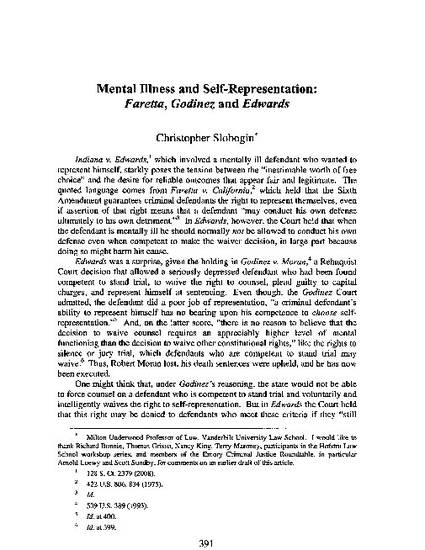
- competency,
- Edwards,
- Godinez,
- Faretta,
- death penalty,
- waiver of counsel
In the recent decision of Indiana v. Edwards the Supreme Court held that the right to represent oneself may be denied to defendants who are competent to stand trial if they "still suffer from severe mental illness to the point where they are not competent to conduct trial proceedings by themselves." Edwards was a surprise, given the Court's holding 15 years earlier in Godinez v. Moran that Nevada courts did not err when they permitted a mentally ill person who had been found competent to stand trial to waive the right to counsel, plead guilty and waive the presentation of mitigation evidence at capital sentencing. A cynic might note that a desire for efficiency could easily explain these decisions: If a defendant with mental illness wants to plead guilty, Godinez suggests, a finding of competency is usually appropriate, but if such a defendant wants to represent him or herself at trial, Edwards advises, a finding of incompetence is probably best. Even if the Court's motivation in Edwards was benign, however, it erred. For there was another path it could have taken that more satisfactorily resolves the tension between the defendant's interest in autonomy on the one hand and, on the other, society's interests in reliable and fair outcomes and in avoiding farcical proceedings that bring the criminal justice system into disrepute. First, the Court should have reaffirmed, rather than ignored, Godinez' explicit holding and Faretta's suggestion that the key issue is competency to choose, not competency to represent oneself. Second, contra to Godinez, it should have recognized that one needs greater capacity to choose to waive counsel than to surrender other rights, which would have better protected both the defendant's autonomy interest and the state's interest in fair proceedings. Third, it could have further protected those interests by requiring an inquiry that Godinez did not consider: an investigation of the reasons the defendant wants to proceed pro se. If those reasons are delusional or non-existent, then the autonomy that gives rise to a right to self-representation does not exist. But otherwise the defendant who understands the risks of waiving the right to counsel should be allowed to represent himself; no competency-to-represent-oneself test, a la Edwards, should be required. If the pro se defendant becomes disorderly during trial, the state's interest in avoiding circus-like proceedings can be accommodated through application of Illinois v. Allen, which permits the trial judge to take steps to maintain the decorum of the courtroom.
Available at: http://works.bepress.com/christopher-slobogin/32/
